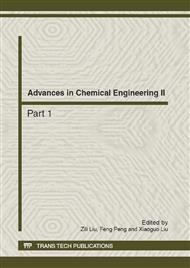[1]
Qunhui Wang,Hongzhi Ma, Xuming Wang,Yongzhen Ji.Modern Chemical Industry,2004,24(7): 56-59.
Google Scholar
[2]
Dongjie Niu, Yaxuan Zhao, Changqing Liu, Xing Yuan,Chen Shen, Xiaoqing Qian, Youcai Zhao..Environmental Pollution and Control,2007,29(5):371-375.
Google Scholar
[3]
Mizuno,O.; Dinsdale, R.; Hawkes, F.R.; Hawkes, D.L.; Noike, T. Bioresource Technology. 2000, 73(1):59-65.
DOI: 10.1016/s0960-8524(99)00130-3
Google Scholar
[4]
Lay, J.J. Biotechnology and Bioengineering 2001, 74 (4):280-287.
Google Scholar
[5]
Patrick C. Hallenbeck. International journal of hydrogen energy,2009,34(17):7379-7389.
Google Scholar
[6]
Chenlin Li, Herbert H. P. Fang. Critical Reviews in Environmental Science and Technology 2007;37(1):1-39.
Google Scholar
[7]
Guangzhen Liu, Jianquan Shen.Journal of Bioscience and Bioengineering,2004, 98(4), 251-256.
Google Scholar
[8]
Tong Zhang, Hong Liu, Herbert H.P. Fang. Journal of Environmental Management. 2003,69(2):149–56.
Google Scholar
[9]
Chiu-Yue Lin, Chao-Chi Chang, Chun-Hsiung Hung. International journal of hydrogen energy. 2008,33(10):2445–2453.
Google Scholar
[10]
Lee KS, Hsu YF, Lo YC, Lin PJ, Lin CY, Chang JS. International journal of hydrogen energy. 2008,33(5):1565–1572.
Google Scholar
[11]
Herbert H.P. Fang,Chenlin Li,Tong Zhang.International journal of hydrogen energy .2006,3(6)1:683–692.
Google Scholar
[12]
Yaoting Fan,Gaosheng Zhang, Xinyong Guo, Yan Xing, Maohong Fan. Biomass Bioenergy 2006,30(5):493–496.
Google Scholar
[13]
Mizuno O, Ohara T, Shinya M, Noike T. Water science and technology, 2000,42(4):345–350.
Google Scholar
[14]
Yokoi H,Saitsu A,Uchida H,et a1 Journalof Bioscience and Bioengineering,2001,91(1):58-63.
Google Scholar
[15]
Wen-Hsing Chen, Shen-Yi Chen, Samir Kumar Khanal, Shihwu Sung. International journal of hydrogen energy. 2006,31(15):2170–2178.
Google Scholar
[16]
Hang-Sik Shin, Jong-Ho Youn, Sang-Hyoun Kim. International journal of hydrogen energy .2004,29(13):1355–1363.
Google Scholar
[17]
Wu J-H, Lin C-Y. Water science and technology. 2004,49(4):223–228.
Google Scholar
[18]
Zhanchun Yang , Xiaoye Chen, Jianliang Zhu. Chinese Journal of Bioprocess Engineering.2005,3(4):62-65.
Google Scholar
[19]
N.Q. Ren, H. Chua, S.Y. Chan, Y.F. Tsang, Y.J. Wang, N. Sin.Bioresource Technology.2007,98(9): 1774–1780.
DOI: 10.1016/j.biortech.2006.07.026
Google Scholar
[20]
Nanqi Ren,Wanqian Guo,Bingfeng Liu, Guangli Cao,Jie Ding. Current Opinionm in Biotechnology.2011,22(3):365-370.
Google Scholar
[21]
Tianqiu Hong, Xiaolong Hao,Hangqing Yu. Technology of water treatment.2004,30(5):270-275.
Google Scholar
[22]
Jianlong Wang, Wei Wan. International journal of hydrogen energy.2009,34(4):799-811.
Google Scholar
[23]
Ming Lin, Nanqi Ren,Aijie Wang,Ying Zhang, Xiangjing Wang,Fang Ma..Journal of Harbin institute of technology.2003,35(2):20-24.
Google Scholar


